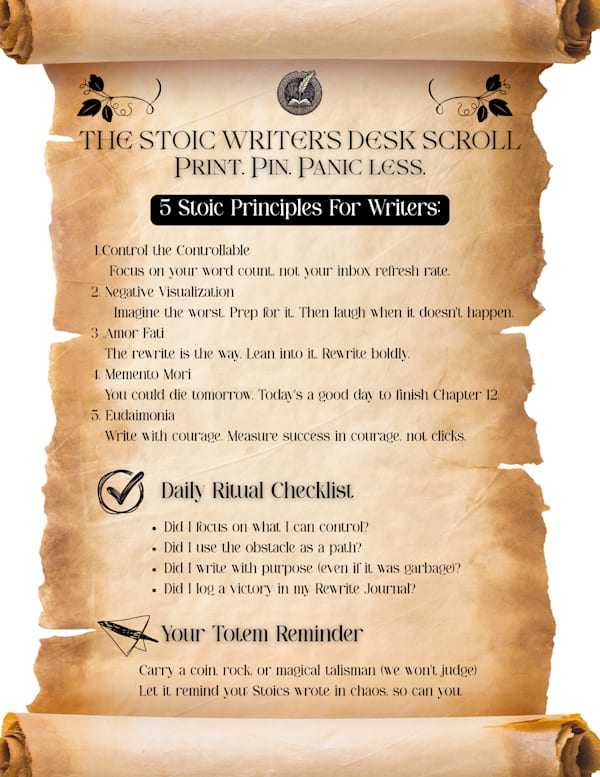Let’s face it: writing is not for the faint of heart. You pour your soul into a manuscript only to watch it get ghosted by agents, roasted by Goodreads reviewers, and—if you're lucky—turned into a paperback your mother buys out of guilt.
In short? The writing life is emotionally violent.
So what’s a frazzled, plot-twisting, revision-dodging author to do?
Easy. Take a cue from the ancient Stoics—those toga-wearing, emotion-wrangling, logic-wielding philosophers who managed to keep it together while the Roman Empire crumbled around them. If Marcus Aurelius could journal his way through plagues and politics, you can make it through your next revision.
This isn’t some fluffy “stay positive” nonsense. Stoicism is basically emotional armor made of logic and low expectations. Which makes it perfect for writers.
Why Stoicism?
Because “screaming into the void” isn’t a productivity strategy.
Stoicism helps you:
- Avoid total mental collapse after your 47th rejection.
- Stop spiraling every time your beta reader says “this scene felt...fine.”
- Write consistently—even when your inner critic sounds like it’s had five espressos and a grudge since 2003.
Here are five Stoic principles every writer should steal shamelessly, plus how to actually use them in your creative process.
1. The Dichotomy of Control: Own What’s Yours, Drop the Rest
“Some things are up to us, and some are not.” – Epictetus
Translation: You can’t control if an editor replies. You can control writing the next scene instead of rage-refreshing your inbox like a caffeine-addled raccoon.
Writing Application:
You don’t control reviews, rejections, or algorithm changes. You control showing up at your desk, choosing your words, and clicking “submit” even when your imposter syndrome is foaming at the mouth.
Action Step:
Make a “Control/No Control” chart. Left column = things you control (daily word count, editing, submitting). Right column = things you don’t (whether Aunt Susan buys your book). Then ignore the right column like it owes you money.
2. Negative Visualization: Expect the Worst (So It Feels Like a Win)
“He robs present ills of their power who has perceived their coming beforehand.” – Seneca
Plot twist: Stoics weren’t sunshine-and-roses people. They were more “prepare for disaster so you’re not caught crying into your tea” types.
Writing Application:
Picture this: Your novel flops. No one shows up to your book launch except your dog and one confused Uber Eats driver. Great. Now that you’ve imagined it? Anything better feels like a glorious surprise party.
Action Step:
Before you hit publish/send/post, imagine the worst-case scenario. Write it down. Then write your calm, rational response (bonus points if it includes chocolate). That way, when hiccups happen, you’re emotionally pre-buffered.
3. Amor Fati: Love the Mess
“The impediment to action advances action. What stands in the way becomes the way.” – Marcus Aurelius
Rewrites that feel like surgery without anesthesia? Reader critiques that make you question your life choices? Fantastic. That is the path.
Writing Application:
That scene that keeps falling flat? The antagonist who feels more like a mildly rude houseguest than a real threat? Don’t resent the challenge—use it. Every problem in your story is a portal to a better one. But only if you stop whining long enough to revise.
Action Step:
Start a “Love the Rewrites” journal. Every time you fix something painful or messy, log what it taught you. Include snacks. Reward progress. Make the pain productive.
4. Memento Mori: You’re Gonna Die. Write Accordingly.
“You could leave life right now. Let that determine what you do and say and think.” – Marcus Aurelius
Sorry to get morbid, but Stoics had a point. We’re not immortal. And neither is the time you’ve got to write that book that’s been squatting in your brain rent-free for six years.
Writing Application:
Stop waiting for the perfect moment. That moment has its feet up on your couch, eating your snacks, and laughing at your procrastination. Your best time to write is now—between life, laundry, and whatever random emergency the universe serves next.
Action Step:
Create a “Deathbed Draft List.” Morbid, yes. Motivating? Also yes. What stories would you regret not writing? Start there. Set a deadline for each one like your time is limited—because it is.
5. Eudaimonia: Define Success on Your Own Terms
“Happiness depends on being free, and freedom depends on being courageous.” – Epictetus
You don’t need to be on a bestseller list to be successful. You don’t need a hundred thousand followers, a six-figure deal, or a trophy shelf of literary awards.
Writing Application:
Writing success isn’t just sales—it’s showing up consistently. It’s courageously finishing what you start. It’s telling the story only you can tell, even if it doesn’t trend on TikTok.
Action Step:
Write your personal “Virtue-Based Metrics” list. Celebrate things like:
- I wrote today despite chaos.
- I edited the scene I was avoiding.
- I stayed true to the story even when it got weird.
And yes, “I wrote the weird part” deserves a cookie.
Stoicism vs. Self-Pity: The Cage Match (No Holds Barred)
Let’s call it like it is: writers can be dramatic. One lukewarm beta read and suddenly it’s all “I shall never write again, for I am but a literary toad.”
But Stoicism? Stoicism walks in with a clipboard and calmly says, “Alright, feelings are valid, but let’s get back to work.”
Here’s how Stoic thinking stacks up against the usual self-pity spiral:
Rejection?
- Self-pity says: “I’m a talentless worm.”
- Stoicism replies: “Rejection is feedback. Feedback is fuel. Let’s revise.”
Writer’s Block?
- Self-pity moans: “My muse has abandoned me.”
- The Stoic shrugs: “Begin. Even badly. Progress over perfection.”
Bad Reviews?
- Self-pity screams: “I’ll never write again!”
- Stoicism calmly sips tea: “Not everyone’s your reader. That’s fine.”
Publishing Delays?
- Self-pity throws a tantrum: “Why me?”
- Stoicism checks the deadline and says: “Out of my control. I’ll write the next thing.”
Comparison to Others?
- Self-pity sulks: “They’re better than me.”
- Stoicism nods: “Their path isn’t yours. Eyes on your own page.”
In short: self-pity spirals, Stoicism stabilizes. One drowns in feelings. The other rewrites Chapter Five. Be the Stoic.
Build a Stoic Ritual for Your Writing Life
Because if Marcus Aurelius could rule Rome and write meditations, you can finish your novella.
🕯 Morning Pages (Stoic Edition):
Ask: What’s within my control today? Then do that.
🕯 Midday Mantra:
Say: “The obstacle is the way.” Bonus points if you say it while glaring at a messy plot outline.
🕯 Evening Inventory:
Reflect: Did I write with courage? Did I stay true to the work? Did I scroll too much on Instagram again?
🕯 Totem Time:
Pick a small object—a coin, a stone, a weird charm that looks like it came from a cursed thrift store. Let it be your reminder to focus, not flail.
Final Thoughts: The Stoic Plot Twist You Didn’t Know You Needed
Writing is hard. Publishing is brutal. But you? You’re made of tougher stuff. You don’t need external validation. You don’t need the market to align with your vibe. You need grit, perspective, and possibly a Stoic with a clipboard telling you to quit whining and keep drafting.
The next time the writing gets hard—and it will—channel your inner Seneca. Light a candle. Take a breath. And write anyway.
Because in the end, the Stoics didn’t write for applause.
They wrote for clarity.
And so can you.
Bonus Freebie:
Download the “Stoic Writer’s Desk Scroll” – a printable one-pager with:
- The 5 Stoic principles
- Daily mantra checklist
- A snarky quote from Epictetus for every occasion
- (Download link here)

